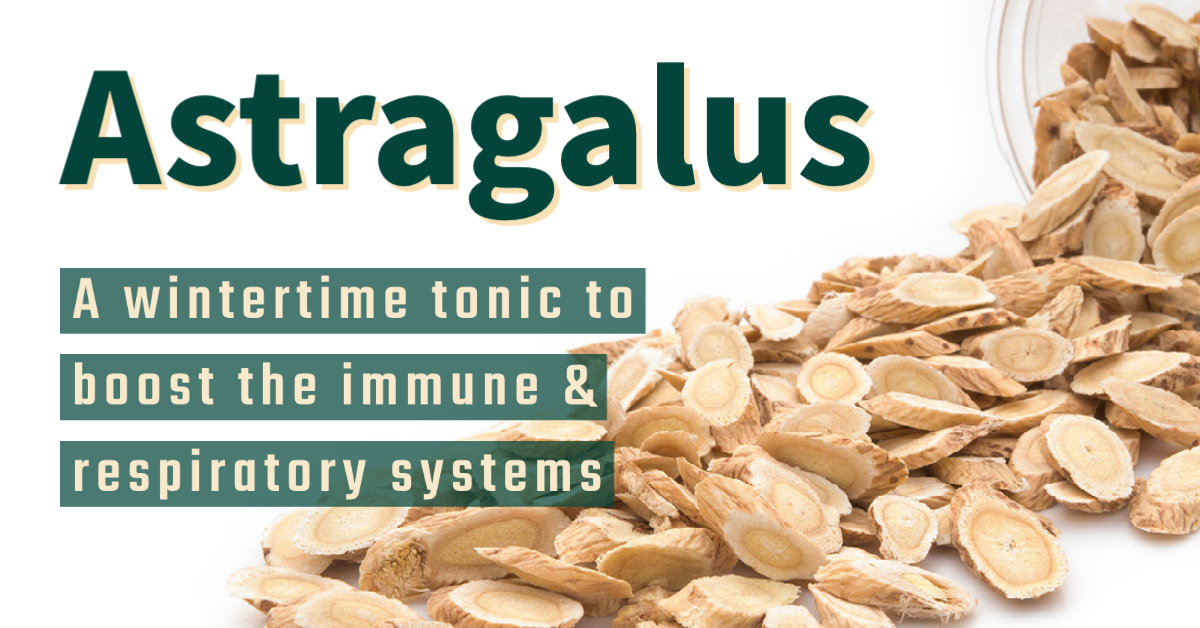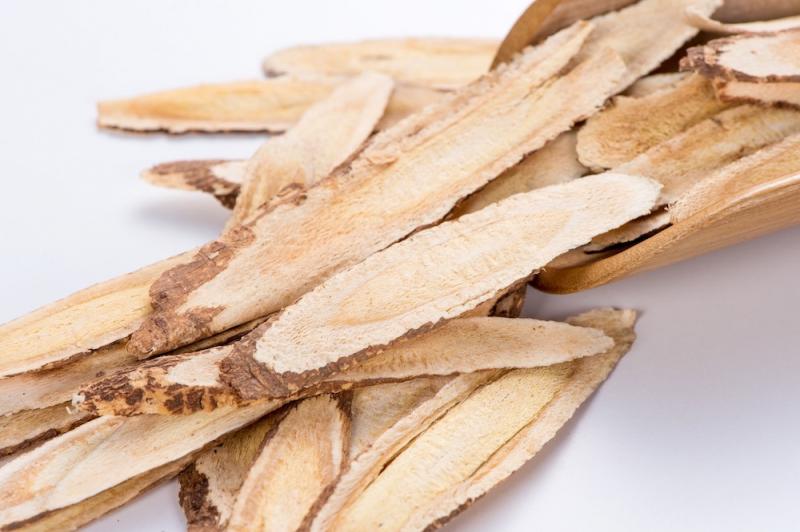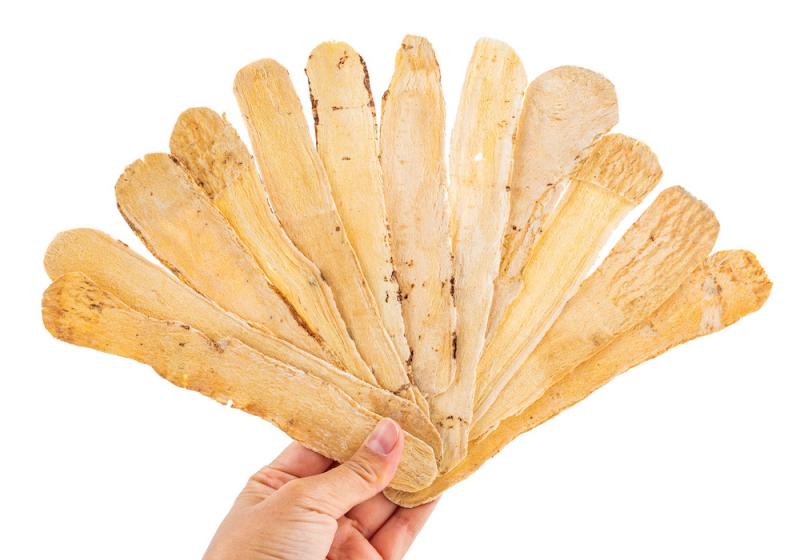
Many herbs taste nasty, which is why I’m grateful when they’re available in capsules, but there are herbs that are quite tasty, and astragalus is one of them. I remember the first time I made a syrup of astragalus. I simmered strips of astragalus root, which look somewhat like tongue depressors, in water and honey. The syrup was very tasty, but the root strips were also delicious. Chewing on them was like eating candy.
That’s good news since astragalus is an amazing tonic herb that strengthens and supports numerous body functions. Called Huang Qi (yellow energy builder) in Chinese medicine it’s one of the superior tonics in TCM for strengthening the lungs and the spleen. I’m writing about it because of its ability to act as a tonic to help people stay healthy during the cold winter months.
Wintertime Tonic
As someone who has a tendency to have respiratory problems, I’m well aware that the cold, dry winter air can aggravate my sinuses and lungs. When I’m out walking in the winter, it’s easy for my nose to start to run and for me to start to develop a cough. Cold air stimulates mucus secretions and causes bronchial passages to constrict, thus making breathing more difficult.
Taking astragalus helps warm the lung tissue and wards off viral infections, like colds and flu. It strengthens the Wei qi or defensive energy of the body. In modern terms, we’d say it stimulates the immune system. Like echinacea, it stimulates phagocytosis, the ability of macrophages in the body’s first line of immune defense to gobble up invaders. In one study it was shown that the stimulating effect of this macrophage activity lasted for up to three days.
Other Health Benefits
 Astragalus is also a general tonic for improving the overall function of the immune system. It may be helpful for cancer, enhancing the effectiveness and reducing the side effects of chemotherapy, while prolonging cancer survival time. It also inhibits cancer from recurring.
Astragalus is also a general tonic for improving the overall function of the immune system. It may be helpful for cancer, enhancing the effectiveness and reducing the side effects of chemotherapy, while prolonging cancer survival time. It also inhibits cancer from recurring.
Astragalus is an antioxidant and may be beneficial for the cardiovascular system. It can be used with other cardiovascular herbs to aid cases of angina, high blood pressure, congestive heart failure, or acute myocardial infarction.
As a spleen tonic in Chinese medicine, astragalus also builds up a weak digestive system. It doesn’t work like digestive bitters, which stimulate digestive secretions, but works more like ginseng or saw palmetto as an aid to improving digestive function in elderly people or people who are suffering from wasting diseases.
It also has adaptogenic properties and may be helpful for night sweats, metabolic syndrome, and fatigue. It can enhance endurance, improve respiration during exercise, and also acts as a blood tonic.
Using Astragalus
 To get this protective effect of astragalus you want to take a fairly large dose. For convenience, you can take 6-8 capsules per day, but you can also use it in food. Since astragalus has a velvety texture and a sweet, buttery taste, it can easily be taken as a tea. Simmer three to four root slices in a quart of water for 30-60 minutes and drink 2-4 cups a day.
To get this protective effect of astragalus you want to take a fairly large dose. For convenience, you can take 6-8 capsules per day, but you can also use it in food. Since astragalus has a velvety texture and a sweet, buttery taste, it can easily be taken as a tea. Simmer three to four root slices in a quart of water for 30-60 minutes and drink 2-4 cups a day.
You can also use it in food. You can make astragalus-fortified rice by adding several strips of astragalus into a pot or rice cooker when making rice. Discard the slices before serving.
You can also put the slices into the stock pot when making stock for soup. K.P. Khalsa gave a recipe for an immune broth using astragalus as follows.
Astragalus Immune Broth
- 3 cups water or vegetable broth
- 1 ounce astragalus root slices (about 7 sticks of dried herb)
- 5 to 10 cloves of fresh garlic, sliced or whole
- Optional: medicinal mushrooms like reishi or shiitake for an extra immune boost
- Salt and pepper to taste
Directions: Place water, garlic, and astragalus in a pot. Bring to a boil. Simmer on medium-low for several hours, until the garlic is soft. Remove herb slices and any fibrous material. Drink hot. Eat garlic in broth, or remove the garlic to spread on toast. Try adding noodles, barley or rice, slivered almonds, and/or carrots (cook till soft) to make a meal.
I’ve also used astragalus in nut butter balls and to make a glycerite or syrup. Both are good ways to give astragalus to kids.
Downloads
Steven's Articles
-

-
Reishi (Ganoderma) Mushroom
A TCM remedy for calming the shen (spirit), balancing…
-

-
Eucommia Bark
A superior tonic that promotes kidney, structural,…
January
-

-
Goldenthread, Phellodendron, and Yellow Root
Three herbal remedies containing the infection-fighting…
-

-
Teasel
A traditional herb for healing bones and joints…
-

-
Barberry and Healthy Personal Boundaries
A thorny shrub for fighting infections and supporting…
December
-

-
The Evidence for Berberine
A yellow alkaloid found in traditional infection-fighting…
-

-
The Sensible Use of Caffeinated Herbs
Kola nuts, guarana, and yerba mate and other herbs…
-

-
The Health Benefits and Problems with Coffee
This popular caffeinated beverage can be beneficial…
October
-

-
Understanding Caffeine & Cellular Adaptation
Preserving the power of caffeine's buzz and the…
September
-

-
Horseradish
A pungent spice for aiding protein metabolism…
-

-
Banaba or Crepe Myrtle
A beautiful tree from Southeast Asia whose leaves…
August
-

-
Monkeyflowers
Flower essences to help see ourselves more clearly…
-

-
Mariposa Lilies
Strengthening the bond between mother and child…
-

-
The Noble Bay Leaf
A common kitchen herb for aiding digestion and…
-

-
Epimedium: Horny Goat Weed
A circulatory stimulant and kidney yang tonic…

